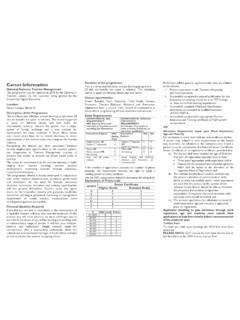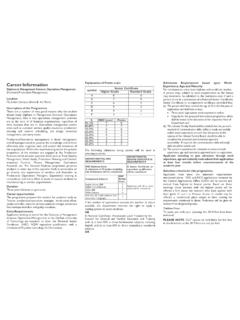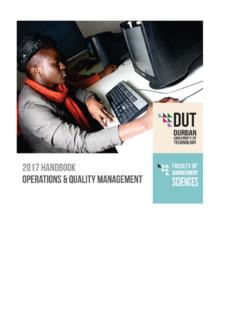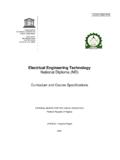Transcription of Bachelor of Engineering Technology in Chemical …
1 Bachelor of Engineering Technology in Chemical Engineering Location: Steve Biko Campus (S4 Level 1) Description of the Programme The learning programme consists of a coherent assembly of knowledge areas associated with Chemical Engineering practice, these include: mathematics, natural sciences, Engineering sciences, design and synthesis, computing and IT, and relevant complementary studies. This assembly of knowledge areas provides a viable platform for further studies and lifelong learning, and will produce graduates who can function in today s fast changing, dynamic and evolving industrial marketplace.
2 The broad training in natural and mathematical sciences, coupled with a strong foundation in Chemical Engineering principles, will produce graduates that are highly numerate and have skills in problem solving, teamwork, communication and Information Technology . This qualification is designed to provide the graduate with knowledge and attributes to work in a diverse spectrum of industries including the Chemical , petrochemical, pulp and paper, polymer, mining, water and waste water treatment, energy, food and pharmaceutical industries.
3 The key attributes of the graduates of this qualification are: The ability to apply established and newly developed Engineering Technology to solve broadly- defined problems and develop components, systems, services and processes. The ability to provide leadership in the application of Technology in safety, health, Engineering and commercially effective operations and have well-developed interpersonal skills. Working independently and responsibly, applying judgement to decisions arising in the application of Technology and health and safety considerations to problems and associated risks.
4 A specialized understanding of Engineering sciences with a deep underlying knowledge of specific technologies together with financial, commercial, legal, social and economic, health, safety and environmental matters. This qualification provides the educational base for registration as a candidate Professional Engineering Technologist with the Engineering Council of South Africa (ECSA) and is recognized internationally through the Sidney Accord. What is Chemical Engineering ? Chemical Engineering is a science that involves the study of processes required for the conversion of raw materials into useful products with minimum environmental impact.
5 It uses the application of physical and life sciences, mathematics, economics and Engineering sciences to produce, transform, and transport chemicals, materials and energy. Chemical Engineering professionals are involved in the transfer of scientific discoveries into modern manufacturing technologies for the production of Chemical and products that benefit society. They are involved in the development and manufacture of consumer products, as well as in design, operation and control of processes in a variety of industries ( , petroleum, petrochemical, Chemical , consumer products, food, feed and pharmaceuticals).
6 Examples of some typical Chemical Engineering operations in South Africa include: The conversion of crude oil into petrol, diesel, wax, etc. The conversion of wood into paper products. The extraction of sugar from sugarcane The conversion of coal into petrol and other useful products. The extraction of precious minerals We make daily use of products that are obtained via the principles of Chemical Engineering , : paper, plastic materials, textiles, petrol, fertilizers, drinkable water etc. Career Opportunities A Chemical Engineering Technologist is employed in Chemical plants for the purpose of: research and development; economic evaluation; Chemical Engineering design; plant operations and management; project management and product marketing.
7 Why do Chemical Engineering at Durban University of Technology ? The mission of the Department of Chemical Engineering is primarily to provide a relevant program, maintain a strong balance between theory and practice, establish and maintain partnerships with industry and excel in research and development with Technology transfer through external engagement. Some of the key characteristics of the department are: The department is recognised as one of the leading University of Technology departments in Chemical Engineering teaching and In keeping with the philosophy of vocational training, the department has one of the most comprehensive laboratory facilities in the country.
8 It has received full accreditation for all its Chemical Engineering programmes from the Engineering Council of South Africa. The department has qualified Chemical engineers with a range of expertise that are responsible for teaching and research. This ensures the maintenance of high standards, a continuous cross flow of ideas, and provides the ideal basis for the transfer of the latest Technology to students. The Department is actively involved in relevant research. The research areas include: water and wastewater treatment; membrane Technology ; particle Technology ; beneficiation of waste streams, catalysis, fuels, thermodynamics and mathematical modelling.
9 The courses offered are current an d relevant because th e Department of Chemical Engineering has exte nsive interaction with th e Chemical industry, research organisations, The South African Institu tio n of Chemical Engineers an d th e Engi neering Council of South Africa. Entry Requirements National Certificate (Vocational) Level 4 A minimum mark of 60% for English and Life Orientation. Mathematics and Physical Science at 70-79% and two other additional vocational subjects related to the field of Chemical Engineering at a minimum of 70-79%.
10 NB: These minimum admission requirements are subject to more restrictive departmental admission requirements where applicable Selection Criteria The following criteria are used in the final selection process: A minimum of 28 points is required for entry to the degree. Subjects Required: Mathematics, Physical Science, English, plus three other subjects excluding Life Orientation. The points for Mathematics and Physical Science will be doubled. Applicants will be ranked according to the sum of their scores for Mathematics and Physical Science, subject to a minimum combined score of 120%.
















